#tho I do love the way the nonchronological storytelling in the first four issues works
Text
This was originally going to go in my post on Dick and Tim's relationship in Red Robin, but I have moved it to a separate post because while I can draw conclusions from it that ultimately serve my defense of Dick, it's kinda a whole other subject.
If you know the story of Tim's hot girl summer, you might know this: he saw a portrait of an "ancestor" of Bruce's and realized that Bruce was alive, and trapped in time, which lead him on a worldwide quest to finding clues about where and when Bruce is. This is true! However, this is not how a reader would experience the comic. Because while the first 4 issues cover most of the saga of Tim's departure from Gotham, you don't actually see that he had any proof of Bruce being alive until issue #12- the end of the arc. And this was done 100% intentionally.
Details and analysis of this under the cut!
In issue #1, this is all you get (in two separate flashbacks spaced over the issue):
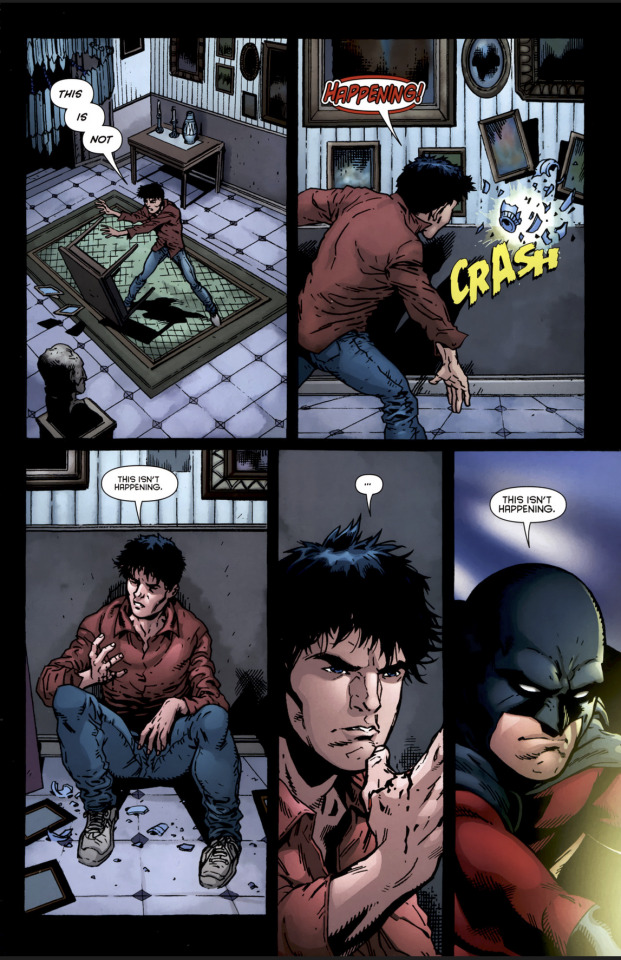
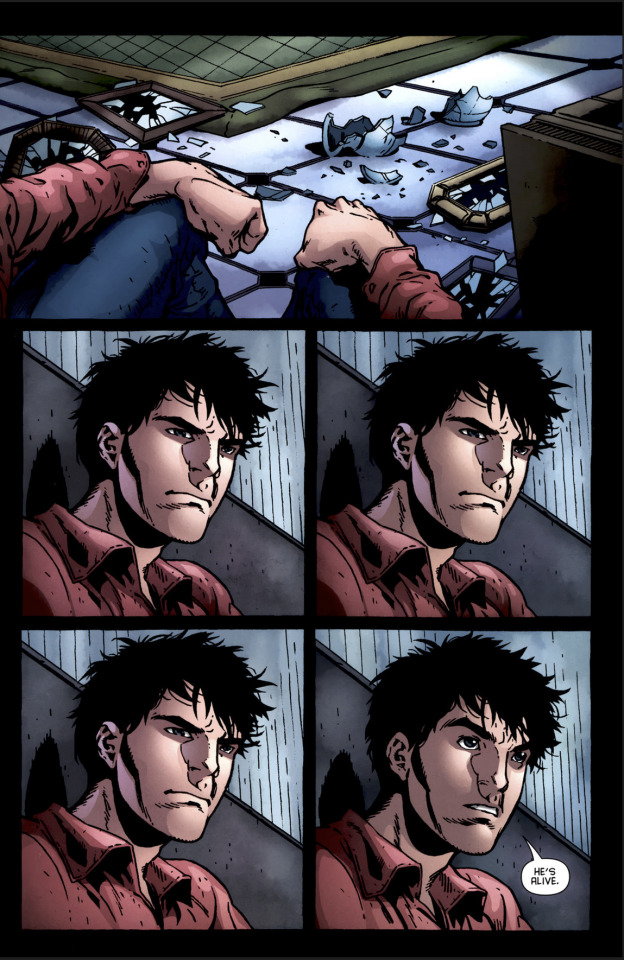
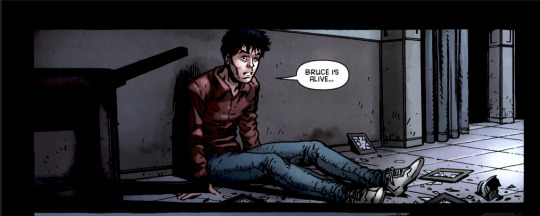
A closeup shot of his face, after throwing a bit of a fit and breaking shit, suddenly saying that Bruce is alive. That's it.
It isn't until issue #12 (which was published an entire real time year later!) that you finally get to zoom out and see what actually happened:
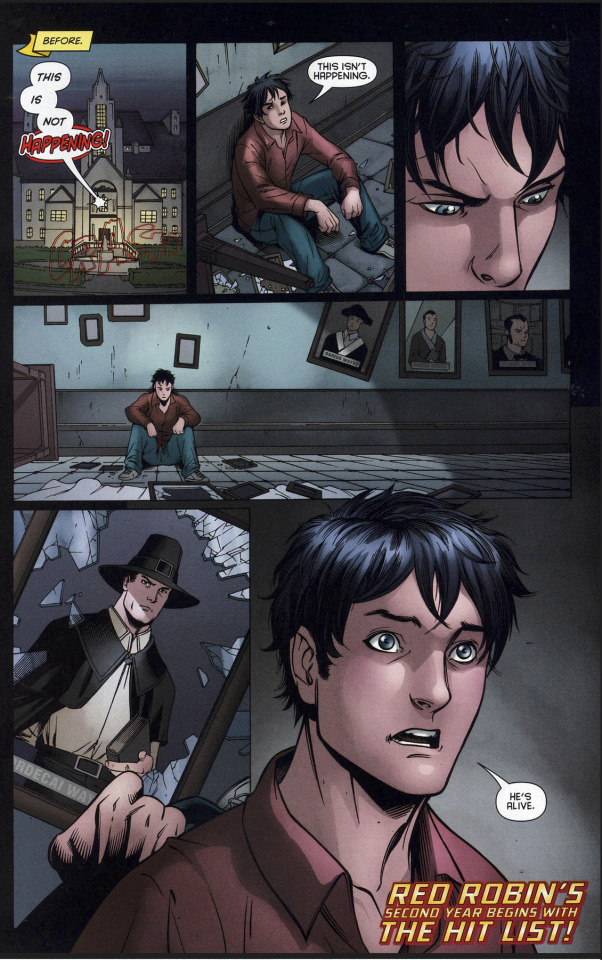
The first four issues jump back and forth between Brucequest and the events immediately preceding Tim's departure from Gotham, and while that time is mostly covered in these issues, they withhold from the reader that Tim had any proof until after everything is over. Tim never mentions it and it isn't shown on page.
This is done very intentionally to create narrative tension! It introduces mystery and doubt!
And more importantly, for the point of this post, it introduces the specific tension that Tim isn't sure if he's right that Bruce is alive and neither is the reader.
(Granted, comics readers are going to know that Batman is alive. They don't kill off big names in comics, not forever, and in any case you can read his adventures in time in a different comic and he's clearly alive there. But that's not the point and you know it.)
When Dick, Stephanie, and Cassie all react to Tim suddenly saying Bruce is alive with alarm, confusion, or pity, the narrative is constructed so that the audience is reacting the same way.
Why was this a part of my Dick defense? Because the narrative itself is reinforcing his view. Tim is supposed to come off as unreliable, information is withheld from the readers to invoke that reaction from them as well, and the characters believing that he's reacting poorly to grief are completely understandable.
But, if you'll allow me to go on some more analysis...
As I said, Tim never mentions his proof on page. He knows he sounds crazy, and yet not in a single conversation does he bring up what caused him to think this way. Throughout the first issue especially, he also has a way of insisting that he's right in a way that makes you think he absolutely does not think he's right.
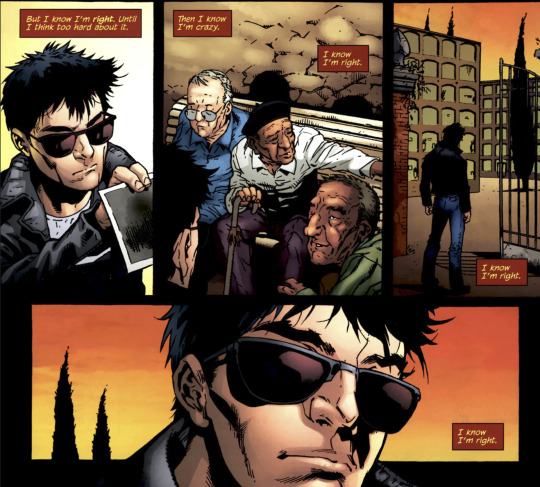
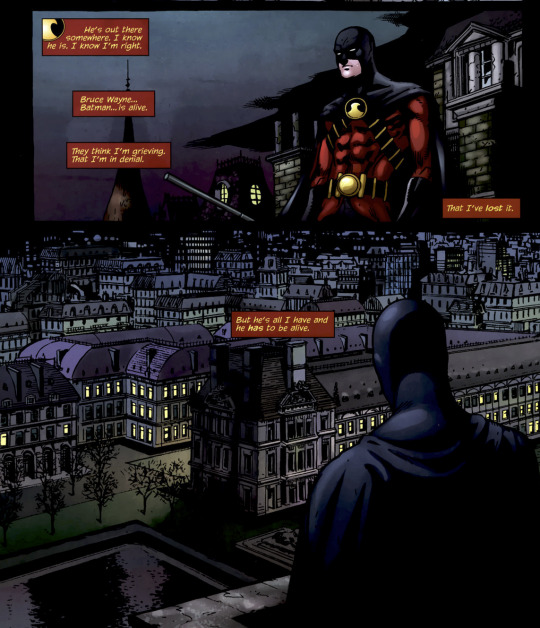
"I know I'm right until I think too hard about it" really inspires confidence. Almost as much as "he's all I have and he has to be alive." That's definitely an argument based in logic and not in grief! (<- lying)

And thinking to yourself "Oh my god, it's true" when you actually find evidence is the sign that you really actually believed it before you found that evidence!
All this to say, Tim was not at all confident in his hunch. He himself doubted whether he was right, but he latched onto the idea in his grief.
Dick wasn't even wrong to believe that Tim was only believing this because he was grieving! Because he absolutely was! Tim was doing all of this as a last ditch effort and it was absolutely motivated by him not wanting to face a world where Bruce was gone. He ended up being right, but even he doubted his own original hunch, and underneath it all knew he was grasping at straws, even though he couldn't bear to admit that out loud. So much so that he, and the narrative, never mentioned it. Not until he already knew he was right.
#red robin#tim drake#dc#dc comics#what even is this....this is just me info dumping about tim I like him and I love the red robin run#tho I do love the way the nonchronological storytelling in the first four issues works#it makes the pacing really good imo and also stretches out some of the emotional conflict to just. hit right#also admittedly this has some overlap with the analysis I DID do in the dick and tim post but that was more about relationships#while this one is about Tim's reasoning... if that makes sense
117 notes
·
View notes